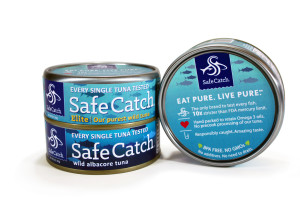Why Eat Canned Tuna?
Why Eat Canned Tuna:
As a food and fitness blogger, I spend a whole lot of time researching, testing, tasting (my favorite part) and creating recipes from foods passed my way from various companies. Although I have had great success in the types of companies that approach me, I cannot always recommend their products for various reasons. From safety to ethical practices, when it comes to food, there really are so many areas for me to consider. Such is the case with canned tuna. Over the years canned tuna has gotten a bad rap for many reasons.
When I met the crew from Safe Catch Tuna and received samples to play around with, I dug deep into the health and safety factors surrounding canned tuna has well as this particular company’s background. You can read more about Safe Catch here and try recipes I created with their wild caught albacore and skipjack tuna. In the meantime-good news-Canned tuna has a place in your pantry and on your table once again.
The Good Stuff
Research suggests that consuming canned tuna may provide a wide range of health benefits, from improving blood vessel function to boosting weight loss. Besides containing high-quality protein, selenium and potassium, canned tuna also possesses omega-3 fatty acids and B vitamins.
Cardiovascular Function
Canned tuna is a rich source of omega-3 fatty acids: eicosapentaenoic acid, or EPA, and docosahexaenoic acid, or DHA. These are healthy unsaturated fats that might improve blood vessel function, lower blood pressure and reduce the risk of cardiovascular disease. Healthy men and women were randomly assigned to eat a meal rich in omega-3 fatty acids or a control meal. Scientists reported in the March 2010 issue of the journal “Clinical Nutrition,” that subjects fed the omega-3-rich meal experienced less stiffness in their arteries compared to subjects fed the control meal.
Lean Protein
Canned tuna serves as an excellent source of lean protein. Each 6-ounce portion contains 33 grams of protein, but less than 2 grams of fat. Your body needs protein for cell growth, a healthy immune system and uses protein to maintain your muscle tissue, and the Harvard School of Public Health mentions fish, including tuna, as a healthy protein option.
No doubt about it, tuna and salmon are super foods. Not only are they great source of lean protein and packed to the gills with B vitamins, they also taste great and can be made into dozens of dishes. What has nutritionists and scientists really excited about tuna and salmon is the omega-3 fatty acids they contain. Omega-3s have lately been associated with all kinds of health benefits from warding off depression and cognitive decline to reducing inflammation and the risk of heart disease. The evidence is so good that the American Heart Association recommends we eat fish rich in omega-3 fatty acids — like tuna and salmon — twice a week.
Omega-3 Fatty Acids
The small amount of fat present in canned light tuna is mostly the healthy unsaturated kind, including omega-3 fatty acids. Omega-3 fatty acids support a healthy brain and promote proper growth and development. These essential fatty acids reduce inflammation in your body, which can reduce your risk of heart disease, cancer and arthritis. Omega-3 fatty acids have been linked to lowering high cholesterol and high blood pressure, and they aid in the treatment of certain mental disorders such as depression and attention deficit hyperactivity disorder, according to the University of Maryland Medical Center.
Niacin
A 3-ounce serving of canned light tuna contains 11.3 milligrams of niacin toward the 14 milligrams women need each day and the 16 milligrams that men need. Niacin is a B-vitamin that helps keep your digestive system, skin and nerves healthy. Niacin supplements might help reduce harmful cholesterol levels and increase beneficial cholesterol as well, according to the website MedlinePlus. A niacin deficiency can cause skin disorders and mental problems.
Vitamin B12
You need 2.4 micrograms of vitamin B12 each day, and a 3-ounce serving of canned light tuna supplies 2.5 micrograms. Vitamin B12 supports the normal function of your brain and also aids in the formation of red blood cells. You also need vitamin B12 for DNA production and to help your body to turn the food you eat into usable energy.
Tuna Nutrition Sources:
http://www.livestrong.com/article/376793-is-canned-tuna-good-for-you/
http://www.healthyeating.org/Healthy-Eating/All-Star
http://healthyeating.sfgate.com/canned-tuna
http://www.hsph.harvard.edu/nutritionsource/protein-questions/
https://safecatch.com/making-pure-tuna/
Disclaimer– I received free samples from Safe Catch to review and provide you with my honest opinion on the products. I am not paid to do so. These are my opinions based on my experience with the products themselves and my interactions with the staff of the company. The opinions in my posts are my own, authentic views. Your experiences and sentiments may vary from my own. Thank you for taking the time to read my post/s. Kind regards, Carol Takakura
 About Carol
About Carol
Everything about My Sage Gourmet is intended to nurture and support you to thrive in every sense of the word. From the Kitchen Coaching, and my artisan kitchen blends to Nutrition Consulting, and the Tone and Sculpt Yoga and weight loss programs, My Sage Gourmet is here to support you!
Carol is a Certified Nutrition Coach, Food and Fitness Blogger, Well Kitchen Coach, Cooking Instructor & Yoga Instructor. She partners with clients in reaching their wellness goals both in and out of the kitchen. Grill, Bake, and Sauté, using Carol’s line of Herbed Salts. From her garden to your table, you will taste the quality in every beautifully organic bite! learn more
Visit me at My Sage Gourmet, where Wellness is Always in Season!
Carol Takakura, CHHC, E-RYT, AADP
Food and Fitness Blogger, Nutrition Consultant, Chef
Blog, recipes, great food tips, fitness, giveaways, reviews and more
818.312.3125
Photographs courtesy of Jttphotography

